Research & Development: Success Factors of MNCs in Foreign Markets
VerifiedAdded on 2021/07/20
|6
|1718
|194
Report
AI Summary
This report delves into the critical factors influencing the success of Research and Development (R&D) within Multinational Corporations (MNCs) operating in foreign markets. It begins by defining R&D and its different types: basic, applied, and development research, highlighting their distinct purposes and applications. The report then identifies core challenges faced by R&D departments, including accelerating innovation cycles, the lack of connection to customers, insufficient accountability metrics, and the prioritization of incremental projects. It further explores the reasons behind the success of R&D-intensive MNCs, focusing on internal and external factors. The analysis emphasizes the significance of cultural differences, state interventions (statism), and market entry strategies as key determinants of an MNC's performance in a foreign market. The study contrasts the approaches of British and Chinese MNCs, highlighting how political economy structures and external factors significantly impact their successes and failures. The report underscores the importance of understanding these multifaceted external influences to enhance the effectiveness of R&D initiatives and achieve favorable outcomes in international business.
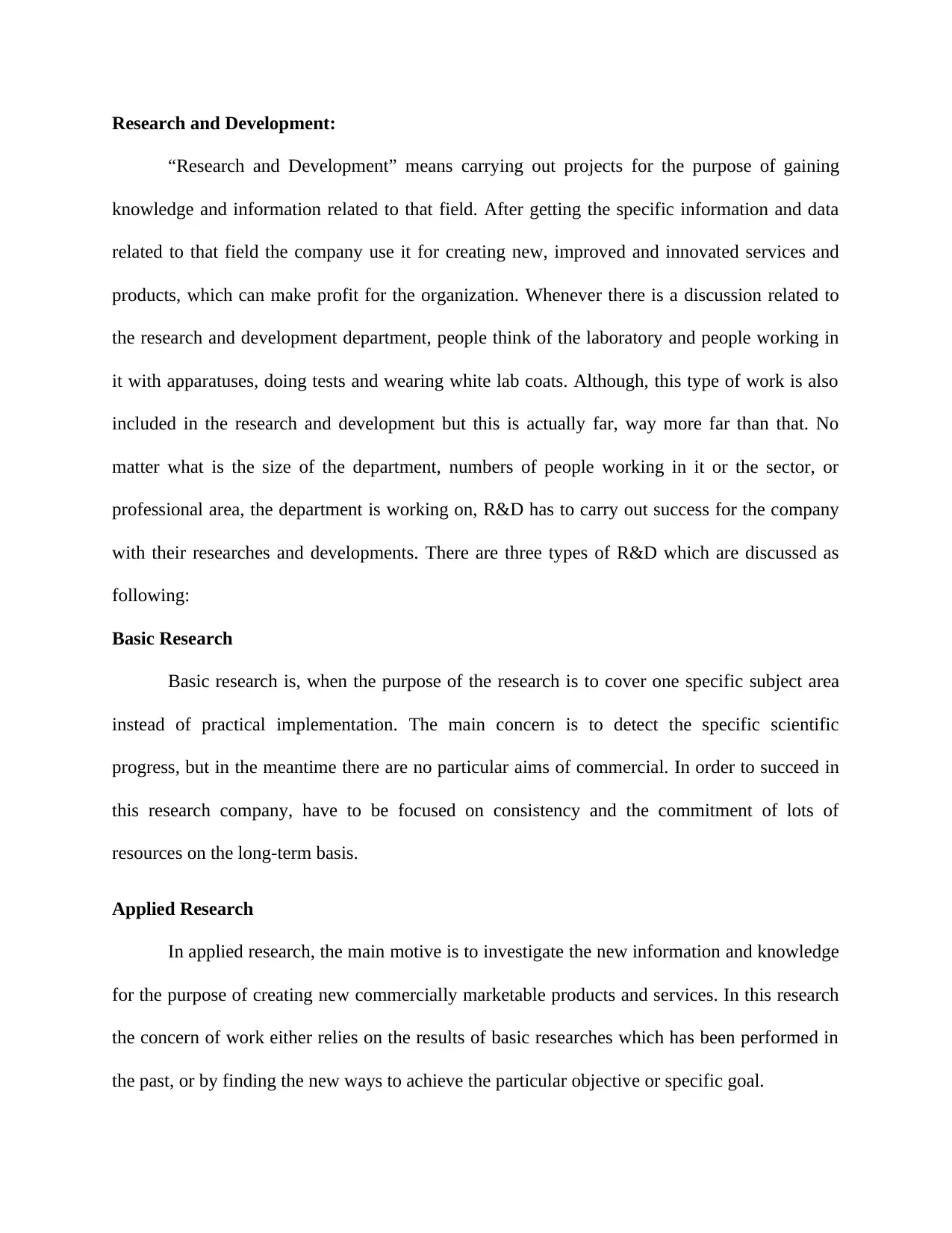
Research and Development:
“Research and Development” means carrying out projects for the purpose of gaining
knowledge and information related to that field. After getting the specific information and data
related to that field the company use it for creating new, improved and innovated services and
products, which can make profit for the organization. Whenever there is a discussion related to
the research and development department, people think of the laboratory and people working in
it with apparatuses, doing tests and wearing white lab coats. Although, this type of work is also
included in the research and development but this is actually far, way more far than that. No
matter what is the size of the department, numbers of people working in it or the sector, or
professional area, the department is working on, R&D has to carry out success for the company
with their researches and developments. There are three types of R&D which are discussed as
following:
Basic Research
Basic research is, when the purpose of the research is to cover one specific subject area
instead of practical implementation. The main concern is to detect the specific scientific
progress, but in the meantime there are no particular aims of commercial. In order to succeed in
this research company, have to be focused on consistency and the commitment of lots of
resources on the long-term basis.
Applied Research
In applied research, the main motive is to investigate the new information and knowledge
for the purpose of creating new commercially marketable products and services. In this research
the concern of work either relies on the results of basic researches which has been performed in
the past, or by finding the new ways to achieve the particular objective or specific goal.
“Research and Development” means carrying out projects for the purpose of gaining
knowledge and information related to that field. After getting the specific information and data
related to that field the company use it for creating new, improved and innovated services and
products, which can make profit for the organization. Whenever there is a discussion related to
the research and development department, people think of the laboratory and people working in
it with apparatuses, doing tests and wearing white lab coats. Although, this type of work is also
included in the research and development but this is actually far, way more far than that. No
matter what is the size of the department, numbers of people working in it or the sector, or
professional area, the department is working on, R&D has to carry out success for the company
with their researches and developments. There are three types of R&D which are discussed as
following:
Basic Research
Basic research is, when the purpose of the research is to cover one specific subject area
instead of practical implementation. The main concern is to detect the specific scientific
progress, but in the meantime there are no particular aims of commercial. In order to succeed in
this research company, have to be focused on consistency and the commitment of lots of
resources on the long-term basis.
Applied Research
In applied research, the main motive is to investigate the new information and knowledge
for the purpose of creating new commercially marketable products and services. In this research
the concern of work either relies on the results of basic researches which has been performed in
the past, or by finding the new ways to achieve the particular objective or specific goal.
Paraphrase This Document
Need a fresh take? Get an instant paraphrase of this document with our AI Paraphraser
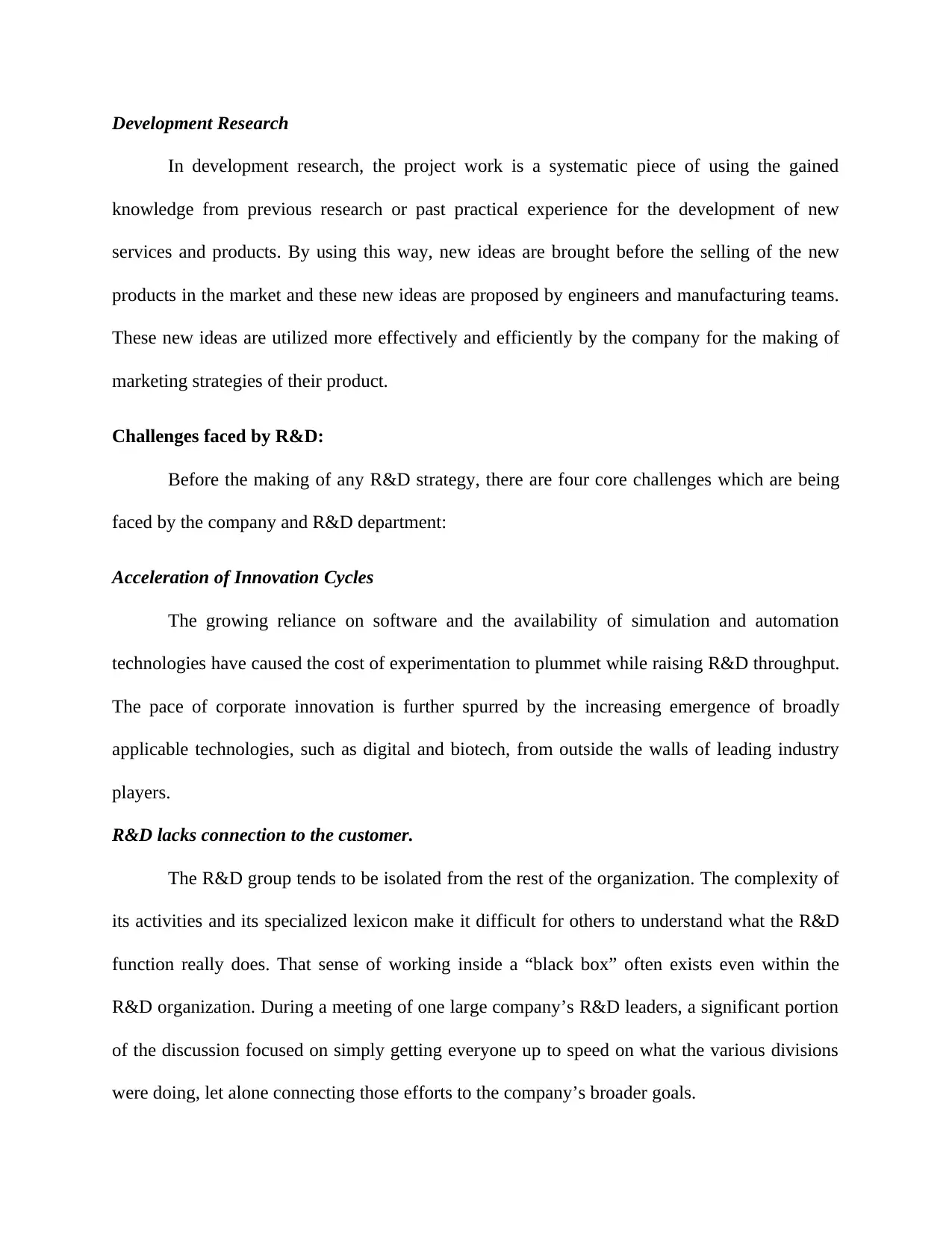
Development Research
In development research, the project work is a systematic piece of using the gained
knowledge from previous research or past practical experience for the development of new
services and products. By using this way, new ideas are brought before the selling of the new
products in the market and these new ideas are proposed by engineers and manufacturing teams.
These new ideas are utilized more effectively and efficiently by the company for the making of
marketing strategies of their product.
Challenges faced by R&D:
Before the making of any R&D strategy, there are four core challenges which are being
faced by the company and R&D department:
Acceleration of Innovation Cycles
The growing reliance on software and the availability of simulation and automation
technologies have caused the cost of experimentation to plummet while raising R&D throughput.
The pace of corporate innovation is further spurred by the increasing emergence of broadly
applicable technologies, such as digital and biotech, from outside the walls of leading industry
players.
R&D lacks connection to the customer.
The R&D group tends to be isolated from the rest of the organization. The complexity of
its activities and its specialized lexicon make it difficult for others to understand what the R&D
function really does. That sense of working inside a “black box” often exists even within the
R&D organization. During a meeting of one large company’s R&D leaders, a significant portion
of the discussion focused on simply getting everyone up to speed on what the various divisions
were doing, let alone connecting those efforts to the company’s broader goals.
In development research, the project work is a systematic piece of using the gained
knowledge from previous research or past practical experience for the development of new
services and products. By using this way, new ideas are brought before the selling of the new
products in the market and these new ideas are proposed by engineers and manufacturing teams.
These new ideas are utilized more effectively and efficiently by the company for the making of
marketing strategies of their product.
Challenges faced by R&D:
Before the making of any R&D strategy, there are four core challenges which are being
faced by the company and R&D department:
Acceleration of Innovation Cycles
The growing reliance on software and the availability of simulation and automation
technologies have caused the cost of experimentation to plummet while raising R&D throughput.
The pace of corporate innovation is further spurred by the increasing emergence of broadly
applicable technologies, such as digital and biotech, from outside the walls of leading industry
players.
R&D lacks connection to the customer.
The R&D group tends to be isolated from the rest of the organization. The complexity of
its activities and its specialized lexicon make it difficult for others to understand what the R&D
function really does. That sense of working inside a “black box” often exists even within the
R&D organization. During a meeting of one large company’s R&D leaders, a significant portion
of the discussion focused on simply getting everyone up to speed on what the various divisions
were doing, let alone connecting those efforts to the company’s broader goals.
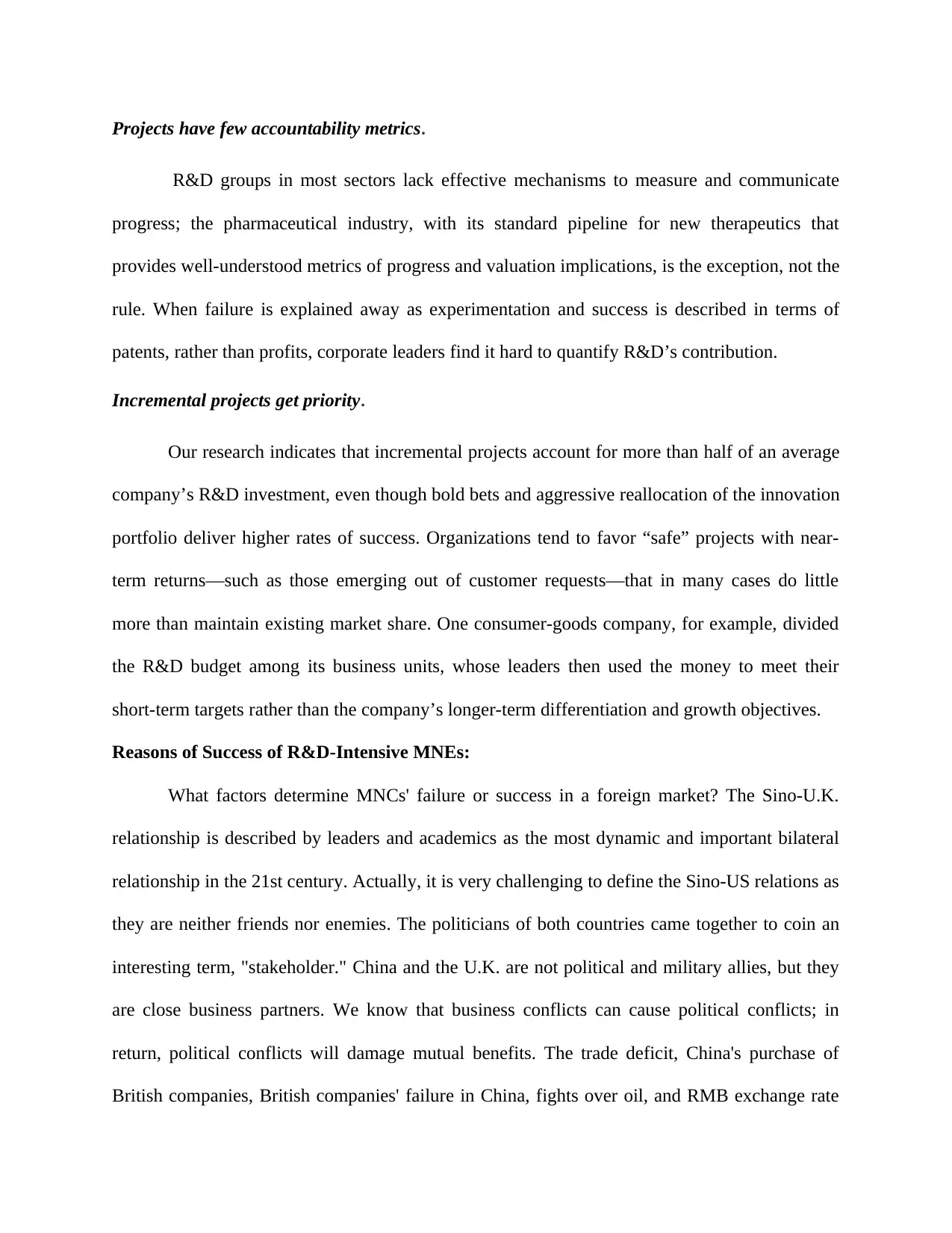
Projects have few accountability metrics.
R&D groups in most sectors lack effective mechanisms to measure and communicate
progress; the pharmaceutical industry, with its standard pipeline for new therapeutics that
provides well-understood metrics of progress and valuation implications, is the exception, not the
rule. When failure is explained away as experimentation and success is described in terms of
patents, rather than profits, corporate leaders find it hard to quantify R&D’s contribution.
Incremental projects get priority.
Our research indicates that incremental projects account for more than half of an average
company’s R&D investment, even though bold bets and aggressive reallocation of the innovation
portfolio deliver higher rates of success. Organizations tend to favor “safe” projects with near-
term returns—such as those emerging out of customer requests—that in many cases do little
more than maintain existing market share. One consumer-goods company, for example, divided
the R&D budget among its business units, whose leaders then used the money to meet their
short-term targets rather than the company’s longer-term differentiation and growth objectives.
Reasons of Success of R&D-Intensive MNEs:
What factors determine MNCs' failure or success in a foreign market? The Sino-U.K.
relationship is described by leaders and academics as the most dynamic and important bilateral
relationship in the 21st century. Actually, it is very challenging to define the Sino-US relations as
they are neither friends nor enemies. The politicians of both countries came together to coin an
interesting term, "stakeholder." China and the U.K. are not political and military allies, but they
are close business partners. We know that business conflicts can cause political conflicts; in
return, political conflicts will damage mutual benefits. The trade deficit, China's purchase of
British companies, British companies' failure in China, fights over oil, and RMB exchange rate
R&D groups in most sectors lack effective mechanisms to measure and communicate
progress; the pharmaceutical industry, with its standard pipeline for new therapeutics that
provides well-understood metrics of progress and valuation implications, is the exception, not the
rule. When failure is explained away as experimentation and success is described in terms of
patents, rather than profits, corporate leaders find it hard to quantify R&D’s contribution.
Incremental projects get priority.
Our research indicates that incremental projects account for more than half of an average
company’s R&D investment, even though bold bets and aggressive reallocation of the innovation
portfolio deliver higher rates of success. Organizations tend to favor “safe” projects with near-
term returns—such as those emerging out of customer requests—that in many cases do little
more than maintain existing market share. One consumer-goods company, for example, divided
the R&D budget among its business units, whose leaders then used the money to meet their
short-term targets rather than the company’s longer-term differentiation and growth objectives.
Reasons of Success of R&D-Intensive MNEs:
What factors determine MNCs' failure or success in a foreign market? The Sino-U.K.
relationship is described by leaders and academics as the most dynamic and important bilateral
relationship in the 21st century. Actually, it is very challenging to define the Sino-US relations as
they are neither friends nor enemies. The politicians of both countries came together to coin an
interesting term, "stakeholder." China and the U.K. are not political and military allies, but they
are close business partners. We know that business conflicts can cause political conflicts; in
return, political conflicts will damage mutual benefits. The trade deficit, China's purchase of
British companies, British companies' failure in China, fights over oil, and RMB exchange rate
⊘ This is a preview!⊘
Do you want full access?
Subscribe today to unlock all pages.

Trusted by 1+ million students worldwide
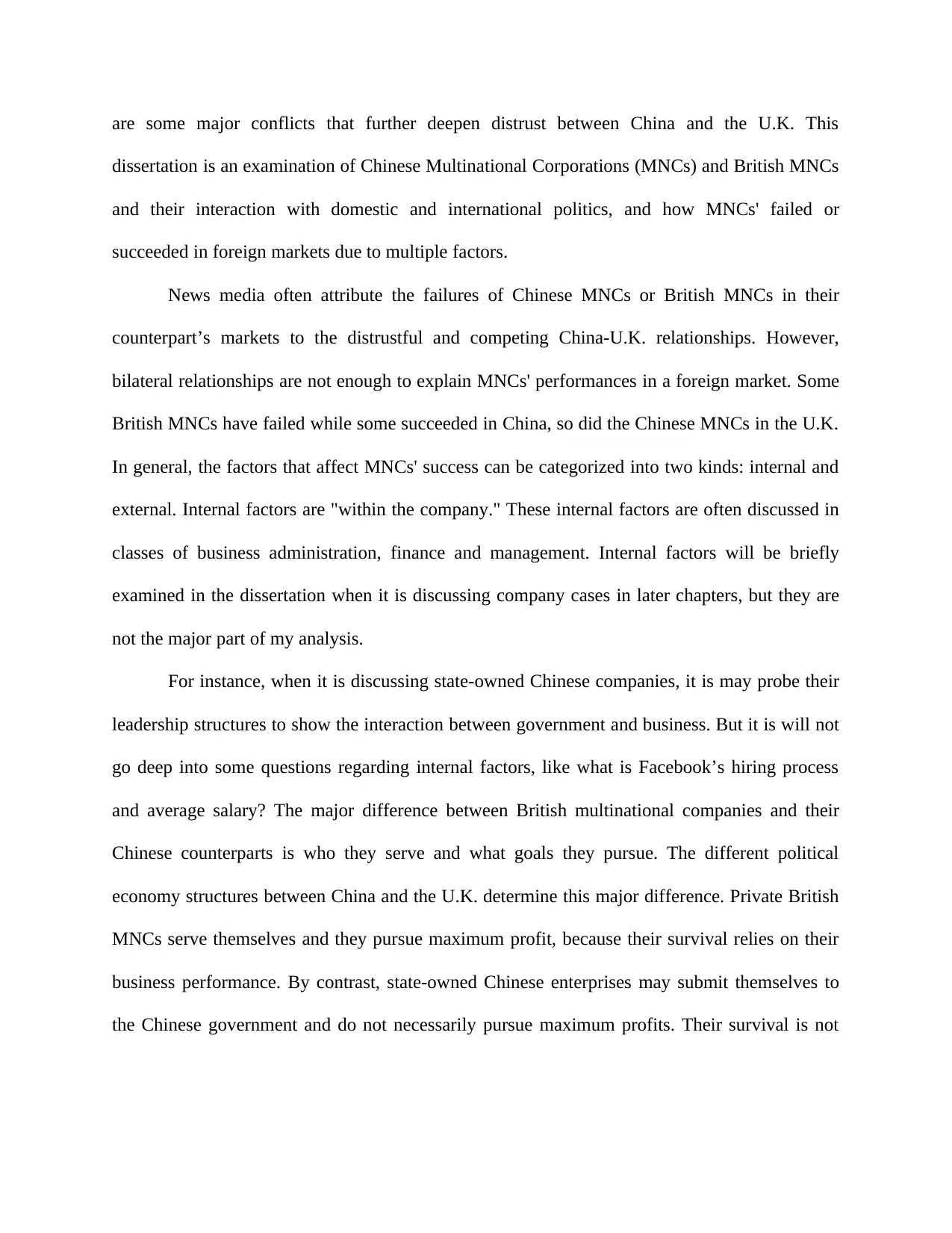
are some major conflicts that further deepen distrust between China and the U.K. This
dissertation is an examination of Chinese Multinational Corporations (MNCs) and British MNCs
and their interaction with domestic and international politics, and how MNCs' failed or
succeeded in foreign markets due to multiple factors.
News media often attribute the failures of Chinese MNCs or British MNCs in their
counterpart’s markets to the distrustful and competing China-U.K. relationships. However,
bilateral relationships are not enough to explain MNCs' performances in a foreign market. Some
British MNCs have failed while some succeeded in China, so did the Chinese MNCs in the U.K.
In general, the factors that affect MNCs' success can be categorized into two kinds: internal and
external. Internal factors are "within the company." These internal factors are often discussed in
classes of business administration, finance and management. Internal factors will be briefly
examined in the dissertation when it is discussing company cases in later chapters, but they are
not the major part of my analysis.
For instance, when it is discussing state-owned Chinese companies, it is may probe their
leadership structures to show the interaction between government and business. But it is will not
go deep into some questions regarding internal factors, like what is Facebook’s hiring process
and average salary? The major difference between British multinational companies and their
Chinese counterparts is who they serve and what goals they pursue. The different political
economy structures between China and the U.K. determine this major difference. Private British
MNCs serve themselves and they pursue maximum profit, because their survival relies on their
business performance. By contrast, state-owned Chinese enterprises may submit themselves to
the Chinese government and do not necessarily pursue maximum profits. Their survival is not
dissertation is an examination of Chinese Multinational Corporations (MNCs) and British MNCs
and their interaction with domestic and international politics, and how MNCs' failed or
succeeded in foreign markets due to multiple factors.
News media often attribute the failures of Chinese MNCs or British MNCs in their
counterpart’s markets to the distrustful and competing China-U.K. relationships. However,
bilateral relationships are not enough to explain MNCs' performances in a foreign market. Some
British MNCs have failed while some succeeded in China, so did the Chinese MNCs in the U.K.
In general, the factors that affect MNCs' success can be categorized into two kinds: internal and
external. Internal factors are "within the company." These internal factors are often discussed in
classes of business administration, finance and management. Internal factors will be briefly
examined in the dissertation when it is discussing company cases in later chapters, but they are
not the major part of my analysis.
For instance, when it is discussing state-owned Chinese companies, it is may probe their
leadership structures to show the interaction between government and business. But it is will not
go deep into some questions regarding internal factors, like what is Facebook’s hiring process
and average salary? The major difference between British multinational companies and their
Chinese counterparts is who they serve and what goals they pursue. The different political
economy structures between China and the U.K. determine this major difference. Private British
MNCs serve themselves and they pursue maximum profit, because their survival relies on their
business performance. By contrast, state-owned Chinese enterprises may submit themselves to
the Chinese government and do not necessarily pursue maximum profits. Their survival is not
Paraphrase This Document
Need a fresh take? Get an instant paraphrase of this document with our AI Paraphraser
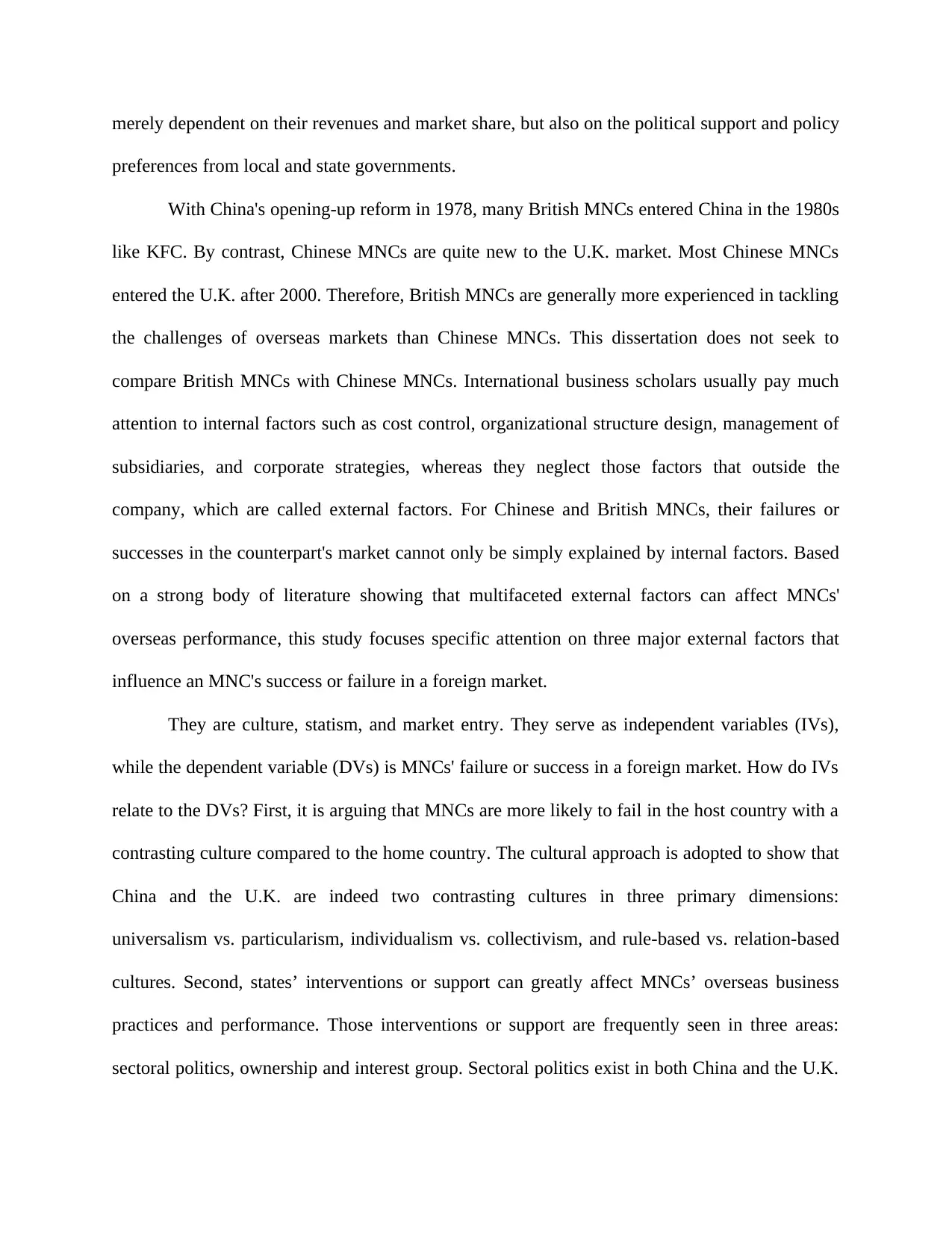
merely dependent on their revenues and market share, but also on the political support and policy
preferences from local and state governments.
With China's opening-up reform in 1978, many British MNCs entered China in the 1980s
like KFC. By contrast, Chinese MNCs are quite new to the U.K. market. Most Chinese MNCs
entered the U.K. after 2000. Therefore, British MNCs are generally more experienced in tackling
the challenges of overseas markets than Chinese MNCs. This dissertation does not seek to
compare British MNCs with Chinese MNCs. International business scholars usually pay much
attention to internal factors such as cost control, organizational structure design, management of
subsidiaries, and corporate strategies, whereas they neglect those factors that outside the
company, which are called external factors. For Chinese and British MNCs, their failures or
successes in the counterpart's market cannot only be simply explained by internal factors. Based
on a strong body of literature showing that multifaceted external factors can affect MNCs'
overseas performance, this study focuses specific attention on three major external factors that
influence an MNC's success or failure in a foreign market.
They are culture, statism, and market entry. They serve as independent variables (IVs),
while the dependent variable (DVs) is MNCs' failure or success in a foreign market. How do IVs
relate to the DVs? First, it is arguing that MNCs are more likely to fail in the host country with a
contrasting culture compared to the home country. The cultural approach is adopted to show that
China and the U.K. are indeed two contrasting cultures in three primary dimensions:
universalism vs. particularism, individualism vs. collectivism, and rule-based vs. relation-based
cultures. Second, states’ interventions or support can greatly affect MNCs’ overseas business
practices and performance. Those interventions or support are frequently seen in three areas:
sectoral politics, ownership and interest group. Sectoral politics exist in both China and the U.K.
preferences from local and state governments.
With China's opening-up reform in 1978, many British MNCs entered China in the 1980s
like KFC. By contrast, Chinese MNCs are quite new to the U.K. market. Most Chinese MNCs
entered the U.K. after 2000. Therefore, British MNCs are generally more experienced in tackling
the challenges of overseas markets than Chinese MNCs. This dissertation does not seek to
compare British MNCs with Chinese MNCs. International business scholars usually pay much
attention to internal factors such as cost control, organizational structure design, management of
subsidiaries, and corporate strategies, whereas they neglect those factors that outside the
company, which are called external factors. For Chinese and British MNCs, their failures or
successes in the counterpart's market cannot only be simply explained by internal factors. Based
on a strong body of literature showing that multifaceted external factors can affect MNCs'
overseas performance, this study focuses specific attention on three major external factors that
influence an MNC's success or failure in a foreign market.
They are culture, statism, and market entry. They serve as independent variables (IVs),
while the dependent variable (DVs) is MNCs' failure or success in a foreign market. How do IVs
relate to the DVs? First, it is arguing that MNCs are more likely to fail in the host country with a
contrasting culture compared to the home country. The cultural approach is adopted to show that
China and the U.K. are indeed two contrasting cultures in three primary dimensions:
universalism vs. particularism, individualism vs. collectivism, and rule-based vs. relation-based
cultures. Second, states’ interventions or support can greatly affect MNCs’ overseas business
practices and performance. Those interventions or support are frequently seen in three areas:
sectoral politics, ownership and interest group. Sectoral politics exist in both China and the U.K.

In China, local officials favor foreign investments in capital-intensive or labor-intensive sectors
based on their personal interests and concerns for social stability. In contrast, foreign investments
in the internet sector are heavily regulated and discouraged. In the U.K., government agencies
and U.K. media are cautious about foreign purchases of British firms in sensitive sectors.
based on their personal interests and concerns for social stability. In contrast, foreign investments
in the internet sector are heavily regulated and discouraged. In the U.K., government agencies
and U.K. media are cautious about foreign purchases of British firms in sensitive sectors.
⊘ This is a preview!⊘
Do you want full access?
Subscribe today to unlock all pages.

Trusted by 1+ million students worldwide
1 out of 6
Related Documents
Your All-in-One AI-Powered Toolkit for Academic Success.
+13062052269
info@desklib.com
Available 24*7 on WhatsApp / Email
![[object Object]](/_next/static/media/star-bottom.7253800d.svg)
Unlock your academic potential
Copyright © 2020–2026 A2Z Services. All Rights Reserved. Developed and managed by ZUCOL.




